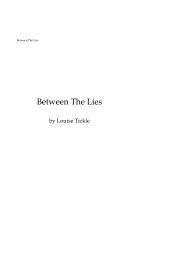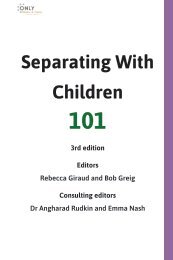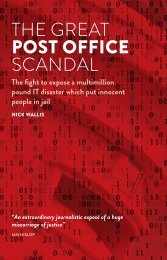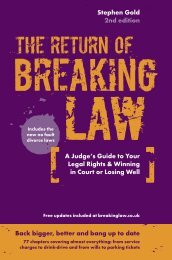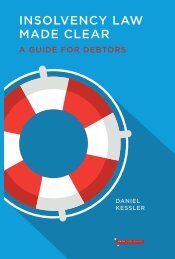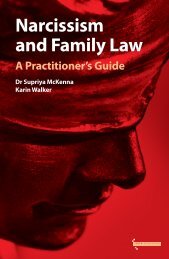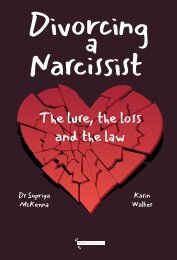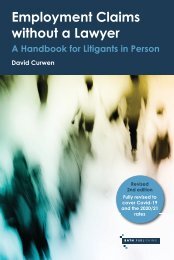The 'Secret' Family Court: Fact Or Fiction?
For approaching two decades, family courts have been accused of making life changing decisions about children and who they live with made in secret, away from the scrutiny of the public gaze. Recognising the force of these accusations, senior family courts judges have, over that time, implemented a raft of rule changes, pilot projects and judicial guidance aimed at making the family justice more accountable and transparent. But has any progress been made? Are there still suspicions that family judges make irrevocable, unaccountable decisions in private hearings? And if so, are those suspicions justified and what can be done to dispel them? In this important and timely new book, Clifford Bellamy, a recently retired family judge who has been at the sharp end of family justice during all these changes, attempts to answer those questions and more. He has spoken to leading journalists, judges and academic researchers to find out what the obstacles to open reporting are – be they legal, economic or cultural - and interweaves their insights with informed analysis on how the laws regulating family court reporting operate. Along the way he provides a comprehensive review of the raft of initiatives he has seen come and go, summarises the position now and uses this experience to suggest how this fundamental aspect of our justice system could adapt in the face of this criticism. Every professional working in the family justice system – lawyers, social workers, court staff and judges - as well as those who job it is to report on legal affairs, should read this informative, nuanced exposition of what open justice means and why it matters so much to those whose lives are upended by the family justice system.
For approaching two decades, family courts have been accused of making life changing decisions about children and who they live with made in secret, away from the scrutiny of the public gaze. Recognising the force of these accusations, senior family courts judges have, over that time, implemented a raft of rule changes, pilot projects and judicial guidance aimed at making the family justice more accountable and transparent.
But has any progress been made? Are there still suspicions that family judges make irrevocable, unaccountable decisions in private hearings? And if so, are those suspicions justified and what can be done to dispel them?
In this important and timely new book, Clifford Bellamy, a recently retired family judge who has been at the sharp end of family justice during all these changes, attempts to answer those questions and more. He has spoken to leading journalists, judges and academic researchers to find out what the obstacles to open reporting are – be they legal, economic or cultural - and interweaves their insights with informed analysis on how the laws regulating family court reporting operate. Along the way he provides a comprehensive review of the raft of initiatives he has seen come and go, summarises the position now and uses this experience to suggest how this fundamental aspect of our justice system could adapt in the face of this criticism.
Every professional working in the family justice system – lawyers, social workers, court staff and judges - as well as those who job it is to report on legal affairs, should read this informative, nuanced exposition of what open justice means and why it matters so much to those whose lives are upended by the family justice system.
Create successful ePaper yourself
Turn your PDF publications into a flip-book with our unique Google optimized e-Paper software.
<strong>The</strong> ‘Secret’ <strong>Family</strong> <strong>Court</strong> – <strong>Fact</strong> <strong>Or</strong> <strong>Fiction</strong>?<br />
“Its significance has if anything increased in an age which attaches<br />
growing importance to the public accountability of public officers and<br />
institutions and to the availability of information about the performance<br />
of their functions.”<br />
It is the case, however, that for as long as the fundamental importance of<br />
this principle of open justice has been acknowledged, so, too, has it also<br />
been acknowledged that there are exceptions. For example, in Scott v Scott 10<br />
Lord Shaw said that the principle of open justice did not apply to proceedings<br />
relating to wards of court (children). He said:<br />
“[their] affairs are truly private affairs; the transactions are transactions<br />
truly intra familiam; and it has long been recognized that an<br />
appeal for the protection of the <strong>Court</strong> in the case of such persons does<br />
not involve the consequence of placing in the light of publicity their<br />
truly domestic affairs.”<br />
That argument still holds good today. In 2017, giving judgment in the Supreme<br />
<strong>Court</strong>, Lord Sumption reaffirmed that:<br />
“<strong>The</strong> principle of open justice has, however, never been absolute.<br />
<strong>The</strong>re have been highly specific historic exceptions, such as the matrimonial<br />
jurisdiction inherited from the ecclesiastical courts, the old<br />
jurisdiction in lunacy and wardship and interlocutory hearings in<br />
chambers, where private hearings had become traditional. Some of<br />
these exceptions persist. Others have been superseded by statute, notably<br />
in cases involving children. More generally, the courts have an<br />
inherent power to sit in private where it is necessary for the proper<br />
administration of justice…Traditionally, the power was exercised<br />
mainly in cases where open justice would have been no justice at all,<br />
for example because the dispute related to trade secrets or some other<br />
subject-matter which would have been destroyed by a public hearing,<br />
or where the physical or other risks to a party or a witness might<br />
make it impossible for the proceedings to be held at all. <strong>The</strong> inherent<br />
power of the courts extends to making orders for the conduct of the<br />
proceedings in a way which will prevent the disclosure in open court<br />
of the names of parties or witnesses or of other matters, and it is<br />
well established that this may be a preferable alternative to the more<br />
drastic course of sitting in private…But the court retains the power<br />
which it has always possessed to allow evidence to be given in such a<br />
way that the identity of a witness or other matters is not more widely<br />
10<br />
[1913] UKHL 2.<br />
14



